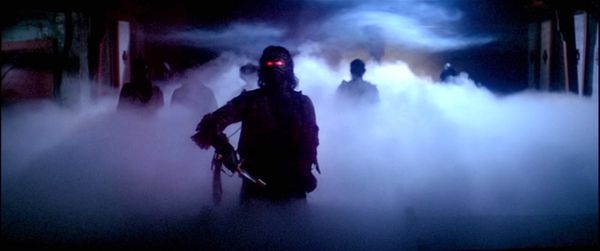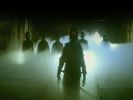Eye For Film >> Movies >> The Fog (1980) Film Review
The Fog
Reviewed by: Jeff Robson

This film was made after the success of Halloween but is a different beast entirely. It opens with an Edgar Allan Poe quote and a wonderfully spooky campfire scene in which a posse of children are captivated by the ghost stories of an old sea captain (John Housman), locating it firmly in the American Gothic tradition, and the terrors subsequently unleashed are all the more terrifying for being supernatural and apparently unstoppable.
The captain tells of a shipwreck that happened 100 years ago, where a vessel was enveloped in an unnatural fog and lost with all hands when it made for a light on the shore which the crew believed to be a lighthouse; and of the legend that on the anniversary of their tragedy, the crew will rise again...

The event was central to the founding of the town of Antonio Bay, which is busy preparing for its centennial party. But the night before, a wave of strange phenomena strikes the town; mirrors shatter, radios switch on and off – and the crew of a trawler have a fatal encounter with the kind of thing that’s not normally mentioned in The Shipping Forecast.
Next morning the townsfolk compare notes about the mysterious goings-on. They include Stevie Wayne (Adrienne Barbeau) a big-city DJ who’s moved to Antonio Bay with her young son for some peace and quiet (ignoring Hollywood Golden Rule No. 456, of course); Nick (Tom Atkins) a local fisherman, who’s just picked up a feisty hitchhiker (Jamie Leigh Curtis); and Mrs Williams (Janet Leigh), the mayoress and wife of the trawler captain. Despite misgivings, she’s determined to carry on with the celebrations.
But the local priest Father Malone (Hal Holbrook) has discovered a journal kept by his grandfather, who was the incumbent 100 years ago. In it he reveals that he was part of a conspiracy by the town’s founding fathers. The shipwreck was no ordinary merchant vessel, but a charter by Blake, a wealthy businessman stricken by leprosy who wished to relocate his island leper colony to the mainland. The conspirators took his money, deliberately started the fire that led his ship onto the rocks, and built the town with their ill-gotten gains.
Aware that news of this would put a bit of a dampener on the festivities, Mrs Williams urges the tormented, borderline alcoholic Malone to keep his family secrets to himself, at least for the time being. But as the witching hour approaches, so does the fog. Within it are the spirits of the dead – and they’re not in a particularly forgiving mood...
It’s a tale worthy of grand old American yarnspinners such as Washington Irving and Nathaniel Hawthorne. Like them (and more modern counterparts like Hitchcock and Stephen King) Carpenter is adept at establishing a deceptively normal (not to say mundane) setting and then unleashing the horrors of hell at it. Simple things like a radio suddenly switching on, a wine glass falling to the floor, or an insistent knocking at the door are an object lesson to contemporary horror’s blood-soaked tyros who seem to think ladling gore over everything automatically makes your movie more scary.
Not that Carpenter’s averse to some blood-letting now and again, or special effects with a high ‘ick’ factor (Curtis’ encounters with one of the murdered trawlermen is as gruesome as you could wish for) but it’s always in the service of the story and he racks up the tension like nobody’s business.
He’s aided immeasurably by co-writer and producer (and then-girlfriend) Debra Hill, who combined with him to deliver a taut, literate script. The director of photography, Dean Cundey, creates lashings of atmosphere and also makes skilful use of the anamorphic widescreen Panavision format to make what’s essentially a low-budget indie look like a major studio production. The special effects guys do wonders with the fog itself, making it truly seem like another character, moving with a will – and not a very good will, at that – of its own.
The human performances are top-notch, too. There are no stereotypes or disposable victims here, but a classy ensemble cast investing their characters with a real human dimension, so that when they have to do battle with evil you really care what happens to them (horror tyros take note once more).
It could be said that Carpenter brings his zombie leper sailors out of the shadows a little too much at the climax; seeing them in the ‘flesh’ is much less effective than when they were barely glimpsed, spectral presences. And the film as a whole lacks the sheer in-yer-face kinetic energy of Halloween. But for the most part this is still a salutary reminder of just how interesting mainstream American genre movie-making could be in those days. And for all of you to whom John Carpenter is just a name on fanboy websites and film studies courses this is as good a place as any to find out what all the fuss is about.
Reviewed on: 05 Oct 2008

















